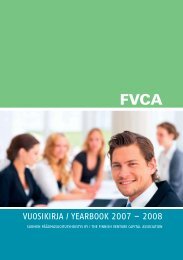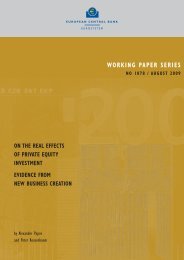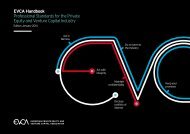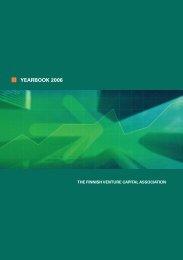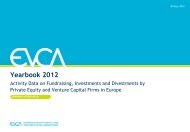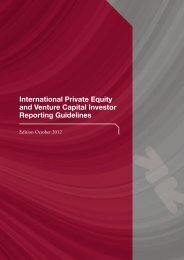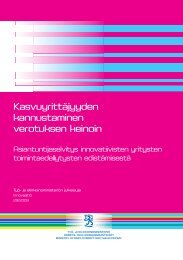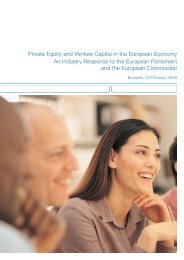Griesheim was not controlled more intensively,” one observernoted. “Some investments were based on overly optimisticor even false investment analysis and planning. But this onlycame to light three years after the investments had beenmade.” Another source characterized this period: “Messer[Griesheim] competed very aggressively to take share in theonsite market, <strong>of</strong>fering low‐priced, long‐term contracts, withlow and sometimes no take‐or‐pay threshold clause, andoccasionally below the cost <strong>of</strong> capital.” 18 All in all, MesserGriesheim’s leverage increased from €423 million in debtin 1996 to €1.6 billion in 2000 (see Exhibit 4 for MesserGriesheim’s key financials). Along with the Messer family’sinvolvement, and anti‐trust issues for any merger <strong>of</strong> equals,the company’s leverage and performance left Hoechst in avery difficult position in terms <strong>of</strong> exit options.Exit Options for Hoechst (Aventis)As Hoechst (Aventis) continued to focus on retrenching asa pure life‐sciences company and divested its agriculturaland chemical concerns, the company reviewed variousexit options for Messer Griesheim, including Rudolf’s desireto take the company public in 1998, or a merger <strong>of</strong> equalswith Swedish industrial gas concern AGA. Discussionswith AGA were underway in 1998–1999, without theparticipation <strong>of</strong> the Messer family. Management thenasked the Messer family to sign confidentiality agreements,although they had not been involved in the discussions.AGA was not alerted to the family’s special voting rights,nor <strong>of</strong> their veto rights. <strong>The</strong> deal fell apart with the familyboycotting negotiations; “It soon became clear that it wouldnot be possible to stage an exit without the agreement<strong>of</strong> the Messer family,” one insider recalled. “<strong>The</strong>y clearlywanted to keep their stake and role in the company.”“Based on the company’s history,” another analyst noted,“it was very likely that the family would want to upholdits entrepreneurial influence in the future.” 19 Backgroundinformation on the family’s motivation can be found inthe company chronicle written by Jörg Lesczenski. 20<strong>The</strong> family proposed a merger with Linde and initiateddiscussions with Linde’s management. <strong>The</strong>y agreed in theoryto keep only 10% <strong>of</strong> the shares, but to retain their specialvoting rights. While Messer Griesheim had initiated thediscussions, Hoechst management acquiesced to thediscussions and the subsequent due diligence, although oneinsider recalled that Hoechst delayed the process and washesitant to agree to a deal. <strong>The</strong> two sides held fundamentallydifferent views: Hoechst sought the highest price they couldget for the Messer Griesheim shares, and the Messer familywas committed to keeping their special rights.However, due to the summer 1999 merger <strong>of</strong> Linde andAGA, the Messer Griesheim deal made less sense; the newlymerged company was large and another merger would havebrought on anti‐trust issues. Yet, some felt the anti‐trustissues were not insurmountable; Linde‐AGA could have soldcertain entities in question to another player, Air Liquide forexample, subsequent to the merger. “It was largely due toHoechst’s behaviour prior to the Linde‐AGA deal that amerger between Messer Griesheim and Linde was notclosed,” a Messer family member said. “We would have beenhappy with the deal with Linde.” Agreeing on an exit strategybecame increasingly difficult.A New CEO: <strong>The</strong> ConsolidatorOn 1 January 2000, Hoechst CFO Dr. Klaus‐JürgenSchmieder replaced Rudolf as CEO; some noted thatSchmieder had gained the reputation <strong>of</strong> “consolidator”within Hoechst, and most analysts expected him to takethe same approach at Messer Griesheim. Hoechst – nowAventis – publicly stated its intentions to sell its MesserGriesheim stake within the year. Along with the Lindediscussions, negotiations with the US firm Praxair had alsobeen underway, but had not been promising. Both anti‐trustissues and the family’s desire to retain its leadership positionin the company’s management brought these negotiationsto a quick end. In March 2000, Aventis announced that itwould divest its Messer Griesheim stake via a limitedauction including financial advisors. Schmieder had alreadydeveloped restructuring plans, working with strategyconsultants Roland Berger who put together a planthat included the divestiture <strong>of</strong> several non‐core MesserGriesheim businesses and a restructuring plan for thecore activities, which among other things, called for areduction <strong>of</strong> 850 employees. As one insider noted, “<strong>The</strong>yneeded to undergo serious restructuring in order to regainfinancial flexibility.”<strong>The</strong> Carlyle Group’s MEC Deal: A Dry Run?An earlier restructuring effort in Messer Griesheim involvedthe divestment <strong>of</strong> Messer Griesheim’s electric arc welding,filler material and cutting business in Europe. In December1999, Messer Cutting & Welding had been disposed <strong>of</strong> byMesser Griesheim to the Messer family. In 2000, MesserCutting & Welding acquired Swiss Castolin Eutectic underthe umbrella <strong>of</strong> a new company, MEC Holding. To achievethis, the Messer family partnered with the Carlyle Group’sCarlyle Europe Partners (I) fund; the Carlyle Groupcontributed cash for its shares <strong>of</strong> MEC Holding (51%). <strong>The</strong>Messer family contributed Messer Cutting & Welding to theentity and thereby held 49% <strong>of</strong> MEC Holding. <strong>The</strong> CarlyleGroup negotiated the ability to take over the CEO position,and to change the operational business directly, should it feelthe need. This deal was for the most part a side show to theAllianz Capital Partners/Goldman Sachs deal. However, itwas the family’s first experience with private equity investors,providing elements <strong>of</strong> a dry run for the second private equityfinancing <strong>of</strong> Messer Griesheim. Some <strong>of</strong> the contractualarrangements <strong>of</strong> the Allianz Capital Partners/Goldman Sachsdeal were structured similarly to the Carlyle deal.18According to an HSBC report, cited in Natasha Alperowicz, “Messer does an about-turn: New ownership focuses on debt reduction”,Chemical Week, 27 February 2002, http://goliath.ecnext.com/coms2/summary_0199-1480758_ITM, accessed 2 November 2007.19“Case Study: Messer Griesheim LBO,” Goldman Sachs, Vallendar, 27 April 2007.20Jörg Lesczenski, “100 Prozent Messer. Die Rückkehr des Familienunternehmens”, München/Zürich 2007.94 Case studies: Messer Griesheim<strong>The</strong> <strong>Global</strong> <strong>Economic</strong> <strong>Impact</strong> <strong>of</strong> <strong>Private</strong> <strong>Equity</strong> <strong>Report</strong> <strong>2008</strong>
<strong>The</strong> deal with Allianz Capital partners/Goldman Sachs: 2001In 2001, Messer Griesheim was in a difficult situation, beinghighly leveraged and in need <strong>of</strong> additional funding just tokeep things running; everyone involved knew the companywas in need <strong>of</strong> external equity financing. <strong>The</strong> complexity <strong>of</strong>any potential deal was obvious from early on, due to thefamily’s involvement, the company’s weak market positionand high leverage. After aggressive expansion between 1995and 2000, and late entry into several key markets wherecompetitors had already cherry‐picked desirable holdings,the company held several questionable investments aroundthe globe and financials that painted a poor picture. Marginswere low compared to market averages and they generatednegative free cash flow (see Exhibit 4 for key financials).“<strong>The</strong>ir investments were <strong>of</strong>ten based on overly optimisticassumptions,” one observer noted, “which led to decreasingmargins over time. Most <strong>of</strong> these investments wereunpr<strong>of</strong>itable.” Yet some <strong>of</strong> these holdings had strategic valueto competitors, who sought to expand their own presencein certain regions, making them a prime takeover target.S. Messer brought in Dr. Stephan Eilers, partner <strong>of</strong>Freshfields Bruckhaus Deringer, who suggested enteringinto negotiations with private equity investors. Again, conflictarose between Hoechst (Aventis) and the Messer family.Hoechst proposed a beauty contest with a range <strong>of</strong> privateequity investors, but the Messer family refused to have anauction. Hoechst suggested selecting a number <strong>of</strong> potentialinvestors; they ended up holding talks with Allianz CapitalPartners and Goldman Sachs, among several.Allianz Capital Partners and Goldman SachsAllianz Capital Partners was a wholly‐owned subsidiary <strong>of</strong> theAllianz Group, a leading global insurance, banking and assetmanagement company. Started in 1998, Allianz CapitalPartners was among the leading companies in the Europeandirect private equity market. 21 Goldman Sachs CapitalPartners, active in Europe since 1993, was the venerableWall Street firm’s private equity funds business.Allianz Capital Partners did not have a traditional private equityfund, but instead received long‐term capital directly from Allianz,and were considered an interesting partner due to their longinvestment horizon; they brought Goldman Sachs in very early inthe negotiations. With the two partners involved, a compromisebetween Hoechst and Messer Griesheim was reached: the familyhad a partner who was aware <strong>of</strong> their long‐term vision to keepcontrol <strong>of</strong> the company; Messer Griesheim had guidance in itsrestructuring efforts (see Exhibit 5). Both sides found the privateequity partners could provide pr<strong>of</strong>essional support in therestructuring process. “We had to build up a trusting relationship,”one Goldman Sachs team member recalled. “And we knew adeal would not be realized without the entire family’s consent.This was very difficult at the beginning. Even the most seniormember <strong>of</strong> the family – former Messer Griesheim CEO H.Messer’s wife – insisted on meeting key investors in person.”Putting the Deal TogetherFrom the outset, parts <strong>of</strong> the deal were informed by theMesser family’s clear goal <strong>of</strong> keeping the firm in their handsafter the private equity investors’ exit. This prompted theinvestors to request the call option as well as the guarantee<strong>of</strong> voting rights.<strong>The</strong> Call Option <strong>The</strong> call option enabled the family to buyback the Goldman Sachs and Allianz Capital Partners sharesafter three years; one participant noted, “even though thiswas an easy formula, the underlying calculations ended upbeing complex as they were not agreed upon beforehand.”Voting Rights <strong>The</strong> negotiations for the by‐laws whichentailed the special voting rights and the veto right tookmuch longer than the negotiations for the basic formula <strong>of</strong>the call option. Prior to the buyout, the family had 50% <strong>of</strong>the voting rights; after, the investors would gain majoritycontrol with their voting rights representing their share <strong>of</strong>ownership <strong>of</strong> 66.2%. However, the family also had anadditional right to veto key strategic decisions. A strategicrestructuring plan that was closely based on Schmieder’soriginal work with Roland Berger was agreed upon with thestipulation that every change <strong>of</strong> strategy required the consent<strong>of</strong> the three parties – the family, Allianz Capital Partners andGoldman Sachs. Additionally, the family held an existingchange‐<strong>of</strong>‐control right, where in case <strong>of</strong> change <strong>of</strong> control,the Messer family had the right to buy back the Allianz CapitalPartners/Goldman Sachs shares at an attractive price.post buyout: corporate governance<strong>The</strong> deal negotiated a way for the Messer family to retainsome control by requiring family consent for key strategicdecisions. Messer Griesheim was governed by a two‐tiersystem: a management board and a supervisory board,or “Aufsichtsrat” (AR). In addition, a sub‐committee tothe supervisory board, a shareholder committee, or“Gesellschafterausschuss” was formed.S. Messer, Schmieder, Jürgen Schöttler and Peter Stockshad been members <strong>of</strong> the management board prior to the dealand continued post buyout. In contrast, both the supervisoryboard and the shareholder committee were impacted by thedeal’s negotiations. <strong>The</strong> supervisory board itself was comprised<strong>of</strong> a shareholder section and an employee section, with equalrepresentation. <strong>The</strong> shareholder group was divided equallybetween the family and Goldman Sachs, each with threerepresentatives. <strong>The</strong> Messer family selected Dr. JürgenHeraeus, Wilhelm von Storm and Dr. Gerhard Rüschen, whileGoldman Sachs chose Dr. Alexander Dibelius, Udo Stark andStephen Trevor. In addition, six employee representatives weremembers <strong>of</strong> the supervisory board.<strong>The</strong> shareholder committee included only representatives<strong>of</strong> the family and representatives <strong>of</strong> Goldman Sachs withno employee representation. Those representatives who weremembers <strong>of</strong> the supervisory board for the family and Goldman21http://www.allianz.com/en/allianz_group/about_us/index1.html, accessed 2 October 2007.<strong>The</strong> <strong>Global</strong> <strong>Economic</strong> <strong>Impact</strong> <strong>of</strong> <strong>Private</strong> <strong>Equity</strong> <strong>Report</strong> <strong>2008</strong> Case studies: Messer Griesheim 95
- Page 2 and 3:
The Globalization of Alternative In
- Page 5:
ContributorsCo-editorsAnuradha Guru
- Page 9 and 10:
PrefaceKevin SteinbergChief Operati
- Page 11 and 12:
Letter on behalf of the Advisory Bo
- Page 13 and 14:
Executive summaryJosh lernerHarvard
- Page 15 and 16:
• Private equity-backed companies
- Page 17 and 18:
C. Indian casesThe two India cases,
- Page 19 and 20:
Part 1Large-sample studiesThe Globa
- Page 21 and 22:
The new demography of private equit
- Page 23 and 24:
among US publicly traded firms, it
- Page 25 and 26:
should be fairly complete. While th
- Page 27 and 28:
according to Moody’s (Hamilton et
- Page 29 and 30:
draining public markets of firms. I
- Page 31 and 32:
FIguresFigure 1A: LBO transactions
- Page 33 and 34:
TablesTable 1: Capital IQ 1980s cov
- Page 35 and 36:
Table 2: Magnitude and growth of LB
- Page 37 and 38:
Table 4: Exits of individual LBO tr
- Page 39 and 40:
Table 6: Determinants of exit succe
- Page 41 and 42:
Table 7: Ultimate staying power of
- Page 43 and 44:
Appendix 1: Imputed enterprise valu
- Page 45 and 46:
Private equity and long-run investm
- Page 47 and 48:
alternative names associated with t
- Page 49 and 50:
4. Finally, we explore whether firm
- Page 51 and 52:
When we estimate these regressions,
- Page 53 and 54:
cutting back on the number of filin
- Page 55 and 56:
Table 1: Summary statisticsPanel D:
- Page 57 and 58:
Table 4: Relative citation intensit
- Page 59 and 60:
figuresFigure 1: Number of private
- Page 61 and 62: Private equity and employment*steve
- Page 63 and 64: Especially when taken together, our
- Page 65 and 66: centred on the transaction year ide
- Page 67 and 68: and Vartia 1985.) Aggregate employm
- Page 69 and 70: sectors. In Retail Trade, the cumul
- Page 71 and 72: employment-weighted acquisition rat
- Page 73 and 74: FIguresFigure 1: Matches of private
- Page 75 and 76: Figure 6:Figure 6A: Comparison of n
- Page 77 and 78: Figure 8:Figure 8A: Comparison of j
- Page 79 and 80: Figure 11: Variation in impact in e
- Page 81 and 82: Figure 12: Differences in impact on
- Page 83 and 84: Private equity and corporate govern
- Page 85 and 86: et al (2007) track the evolution of
- Page 87 and 88: groups aim to improve firm performa
- Page 89 and 90: distribution of the LBO sponsors, m
- Page 91 and 92: the most difficult cases. This stor
- Page 93 and 94: to see whether these changes of CEO
- Page 95 and 96: Figure 3:This figure represents the
- Page 97 and 98: TablesTable 1: Company size descrip
- Page 99 and 100: Table 5: Changes in the board size,
- Page 101 and 102: Table 7: Board turnoverPanel A: Siz
- Page 103 and 104: Part 2Case studiesThe Global Econom
- Page 105 and 106: European private equity cases: intr
- Page 107 and 108: Exhibit 1: Private equity fund size
- Page 109 and 110: Messer Griesheimann-kristin achleit
- Page 111: ealized it was not possible to grow
- Page 115 and 116: the deal, the private equity invest
- Page 117 and 118: Exhibit 1: The Messer Griesheim dea
- Page 119 and 120: Exhibit 5: Post buyout structureMes
- Page 121 and 122: New Lookann-kristin achleitnerTechn
- Page 123 and 124: feet. This restricted store space w
- Page 125 and 126: institutional investors why this in
- Page 127 and 128: Although a public listing did not a
- Page 129 and 130: Exhibit 5: Employment development a
- Page 131 and 132: Chinese private equity cases: intro
- Page 133 and 134: Hony Capital and China Glass Holdin
- Page 135 and 136: Hony’s Chinese name means ambitio
- Page 137 and 138: Establishing early agreement on pos
- Page 139 and 140: Executing the IPOEach of the initia
- Page 141 and 142: Exhibit 1A: Summary of Hony Capital
- Page 143 and 144: Exhibit 4: Members of the China Gla
- Page 145 and 146: Exhibit 6A: China Glass post‐acqu
- Page 147 and 148: Exhibit 8: China Glass stock price
- Page 149 and 150: 3i Group plc and Little Sheep*Lily
- Page 151 and 152: y an aggressive franchise strategy,
- Page 153 and 154: soul” of the business. But there
- Page 155 and 156: Exhibit 1: Summary information on 3
- Page 157 and 158: Exhibit 6: An excerpt from the 180-
- Page 159 and 160: Indian private equity cases: introd
- Page 161 and 162: ICICI Venture and Subhiksha *Lily F
- Page 163 and 164:
investment,” recalled Deshpande.
- Page 165 and 166:
2005 - 2007: Moderator, protector a
- Page 167 and 168:
Exhibit 3: Subhiksha’s board comp
- Page 169 and 170:
Warburg Pincus and Bharti Tele‐Ve
- Page 171 and 172:
founded two companies at this time
- Page 173 and 174:
By 2003 this restructuring task was
- Page 175 and 176:
Exhibit 1C: Private equity investme
- Page 177 and 178:
Exhibit 4B: Bharti cellular footpri
- Page 179 and 180:
Exhibit 6: Summary of Bharti’s fi
- Page 181 and 182:
Exhibit 7: Bharti’s board structu
- Page 183 and 184:
In the 1993‐94 academic year, he
- Page 185 and 186:
consumer products. She was also a R
- Page 187 and 188:
AcknowledgementsJosh LernerHarvard
- Page 189:
The World Economic Forum is an inde






